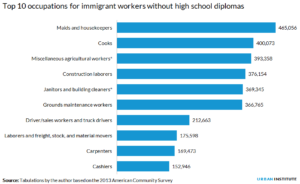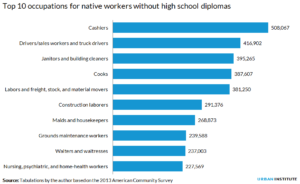In 2012, former President Barack Obama created DACA, the Deferred Action for Child Arrivals, through an executive order—this program “has allowed hundreds of thousands of young people who were brought to the United States illegally as children to remain in this country,” said NBC News. In fact, The Cato Institute stated that these DACA participants, called Dreamers, have the opportunity to “receive temporary protection from deportation, work permits, and an incentive to invest in their own human capital” as long as they “have lived in the United States for five years or longer and do not have a criminal record.” In other words, Dreamers have been able to “achieve milestones typically associated with the American dream, such as pursuing higher education, earning better wages to support their families, and buying homes,” as explicated by American Progress.  On September 5th, 2017, Attorney General Jeff Sessions announced President Trump’s decision to terminate DACA which would essentially kick out about 800,000 Dreamers out of the country. This is not only inhumane, but will have an inevitable impact on the workforce in America—although both sides of the issue will be explored, DACA is more of a boost to the economy than a deterrent.
On September 5th, 2017, Attorney General Jeff Sessions announced President Trump’s decision to terminate DACA which would essentially kick out about 800,000 Dreamers out of the country. This is not only inhumane, but will have an inevitable impact on the workforce in America—although both sides of the issue will be explored, DACA is more of a boost to the economy than a deterrent.
DACA recipients “are relatively well-educated, meaning they have the capacity to make the economy that much more productive,” according to NPR. The average age of DACA recipients is 22 and they “earn about $17 an hour on average, ‘tend to be younger, better educated, and more highly paid than the typical immigrant,’” said Time. As a 21-year-old at attending a reputable college like the University of Southern California, I have never had a job earning the wage of the average Dreamer—and have actively looked for one—which demonstrates their success and path to fulfillment of the American Dream. In exact numbers, the U.S. Citizenship and Immigration Services declared 787,580 people as DACA recipients through March 2017, and 87% of them are employed as conducted in an October 2016 survey by the Center for American Progress. Also to note, 6% of Dreamers “even starts businesses of their own, thus creating more jobs for others,” instead of taking them away, according to New Republic. The Cato Institute even compares the dreamers to recipients of H-1B visas, “skilled workers who are invited into the country to fulfill specific economic needs.” Most of the H-1B visa participants, like Dreamers, tend to be younger and more educated, thus, they have a closer resemblance than Dreamers do to other unauthorized immigrants. To note, it is crucial to separate DACA recipients in a separate category form other unauthorized immigrants.
According to a 2016 study in the Journal of Public Economics by Nolan G. Pope, “DACA moved between 50,000 and 75,000 immigrants into employment from either outside the formal labor force or unemployment, and increased the average income of immigrants in the bottom of the income distribution.” This is a step up for the economy because a higher income means more money to spend and being able to pay their taxes, thus, further stimulating the economy. The “extra money they made let to financial stability and a big increase in car and home purchases,” according to New Republic. On top of that, a 2014 survey by the American Immigration Council found that “59 percent of DACA recipients reported getting their first job, 45 percent received a pay increase, 49 percent opened their first bank account, and 33 percent got their first credit card due to their participating in DACA”—all factors that, again, boost the economy.
On the other hand, the White House’s main argument is that Dreamers are taking jobs away from Americans. At the press briefing on the day of Trump’s announcement, White House Press secretary Sarah Huckabee Sanders said, “I think that it’s a known fact that there are over 4 million unemployed Americans in the same age group as those that are DACA recipients” (qtd. in The Hill). Although it seems logical to believe that more jobs would open up for Americans if 800,000 DACA recipients no longer existed, but “[there] is no evidence of that,” according to chief economist at Moody’s Analytics Mark Zandi. First of all, the Bureau of Labor Statistics stated that the unemployment rate is 4.2 percent as of September 2017 which is the lowest it has ever been—to put into perspective, the last time our annual unemployment rate has been in the fourth percentile was a decade ago in 2007 at 4.6. This means that our job market is currently doing very well. President and CEO of economic research firm Perryman Group, Ray Perryman, adds, “I think the primary thing that would argue against [the White House’s claim] at this point is, we are at full employment with more job openings than at any point in history” (qtd. in NPR).
If the program continues as it has been, it could end up covering 1.3 million people, which means there is that much more potential for a more effective and productive workforce. But a study by the Center for American Progress shows that an average of 30,000 DACA beneficiaries will be out of work each month which becomes added pressure for employers to fill those spots in a short amount of time to maintain an efficient workplace—if the employers fail to do so, it could potentially result in the closing of their business, thus, Americans losing their jobs as well. And among the 800,000 Dreamers are those with valuable jobs such as in the health-care system. The Association of American Medical Colleges “projects the physician shortage could reach 105,000 by 2030,” as well as “lose nurses, nurse practitioners, pharmacists, medical researchers and slews of other professional and nonprofessional healthcare workers” by kicking out current medical students with DACA status. And not only will the shortage of health workers negatively impact our country, but the AAMC adds that “when physicians train in teams that are culturally diverse,” such as with Dreamers, “it improves outcomes because everyone is sensitized to the needs and customs of patients from immigrant and minority backgrounds.” So we aren’t just losing Dreamers, we are losing compassionate physicians—from diverse backgrounds and those who speak other languages—who help make the entire health-care system a more culturally adept place.
In addition to the fact that Dreamers aren’t taking away jobs from Americans, not even the “lower-educated or low-wage immigrants aren’t stealing our jobs,” according to New Republic. These immigrants compete on their own in an entirely different and more low-skilled workforce than those who are American born citizens, even natives without high school diplomas. While “[less-educated] native workers are over-represented in occupations that interact with the public and coworkers and that have supervising responsibilities, licensing requirements, and demanding mechanical and computer operations,” immigrants dominate jobs with manual or bilingual skills, according to Urban. Urban adds that the two groups “even could be complementing each other.” On top of that, a study by the National Academies of Sciences, Engineering and Medicine, research done by 14 leading economics and other scholars, states that “We found little to no negative effects on overall wages and employment of native-born workers in the longer term” (qtd. in the New York Times). The White House’s statements were simply false.
Not only are Dreamers efficient workers, but the removal of this program would be a huge hit to the economy. In fact, “removing the DACA immigrants from the economy would cost the U.S. $215 billion in lost economic output over 10 years, plus another $60 billion in lost taxes” and “[deporting them would cost another $7.5 billion, and when that’s added up the cost of ending the DACA program comes to a total of minus $283 billion,” according to the Cato Institute. Jeff Sessions argued that “expelling DACA permit-holders—again, many of whom are children—from the country is vital to protecting Americans from ‘crime, violence, and terrorism,’ alluding to the marauding bands of criminal undocumented immigrants,” said GQ. This is also not true because to be eligible for DACA, one must pass a background check as well as a screening process for felonies and misdemeanors. So we aren’t making America any safer by rescinding DACA—we are only increasing government spending and wasting taxpayer dollars on unnecessary deportation of those who have not only done no wrong, but are helping grow our economy. These “high-skilled immigrants add to the nation’s stock of human capital, boosting productivity and growth,” stated U.S. News.
Dreamers know of no other home besides America. And simply put, these Dreamers “never knowingly broke any law and have been productive and peaceful members of society since their arrival,” according to the Cato Institute. And with backed-up evidence that Dreamers are, in fact, not taking jobs away from natives—which is the White House’s main argument—and since they pose as no threat to the country—their other argument of Dreamers being potential criminals—, what are we waiting for? Currently, DACA is still due to expire in six months, although current permits will be honored until expiration.
Works Cited
Albright, Ike Brannon and Logan. “The Economic and Fiscal Impact of Repealing DACA.” Cato Institute. Cato Institute, 18 Jan. 2017. Web.
Bryant, Meg. “Ending DACA Would Damage the Provider Workforce.” Healthcare Dive. Industry Dive, 05 Oct. 2017. Web.
“Bureau of Labor Statistics Data.” U.S. Bureau of Labor Statistics. U.S. Bureau of Labor Statistics, 10 Oct. 2017. Web.
Covert, Bryce. “No, DACA Immigrants Aren’t Stealing American Jobs.” New Republic. New Republic, 07 Sept. 2017. Web.
Delk, Josh. “White House Claims DACA Recipients Take Jobs Away from Americans.” TheHill. Capitol Hill Publishing Corp., 05 Sept. 2017. Web.
Enchautegui, Maria E. “Immigrant and Native Workers Compete for Different Low-skilled Jobs.” Urban Institute. Urban Institute, 25 Mar. 2016. Web.
Horowitz, Julia. “Trump’s DACA Decision Could Cost Thousands of Jobs, Study Says.” CNNMoney. Cable News Network, 30 Aug. 2017. Web.
Kurtzleben, Danielle. “FACT CHECK: Are DACA Recipients Stealing Jobs Away From Other Americans?” NPR. NPR, 06 Sept. 2017. Web.
“National Unemployment Rate at 4.2 Percent through September 2017.” National Conference of State Legislatures. National Conference of State Legislatures, 6 Oct. 2017. Web.
Nicole Prchal Svajlenka, Tom Jawetz, and Angie Bautista-Chavez. “A New Threat to DACA Could Cost States Billions of Dollars.” Center for American Progress. Center for American Progress, 21 July 2017. Web.
Preston, Julia. “Immigrants Aren’t Taking Americans’ Jobs, New Study Finds.” The New York Times. The New York Times, 21 Sept. 2016. Web.
Salisbury, Ian. “DACA: Economic Cost of Deporting Undocumented Immigrants | Money.” Time. Time, 7 Sept. 2017. Web.
Stone, Chad. “The High Costs of Ending DACA.” U.S. News. U.S. News & World Report L.P., 29 Sept. 2017. Web.
Willis, Jay. “Jeff Sessions’ Rationale for Ending DACA Is Outrageously Disingenous.” GQ. GQ, 05 Sept. 2017. Web.


Leave a Reply
You must be logged in to post a comment.